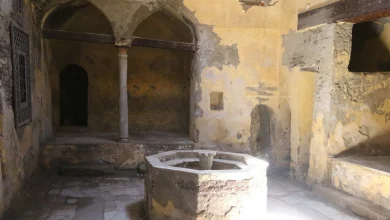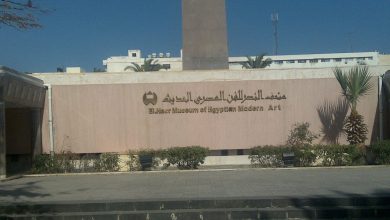“Simsimiyya”.. the secret of joy that crossed from the canal to UNESCO
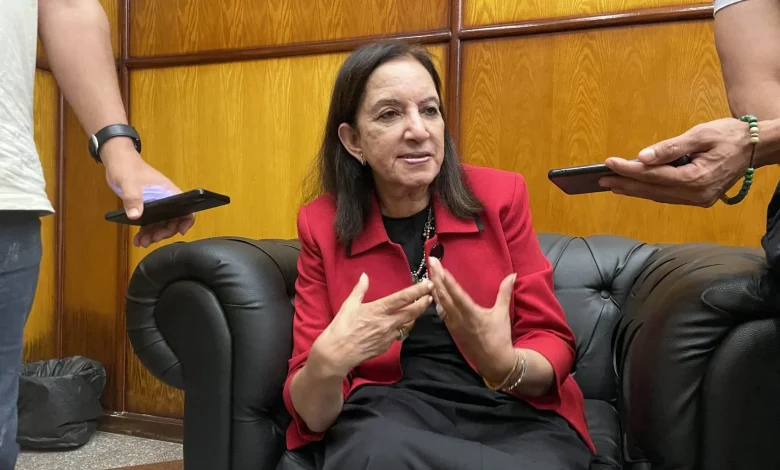
Cultural initiatives to teach children how to play the simsimiyya instrument have begun in the cities of Port Said, Ismailia, and Suez, in support of registering the instrument on UNESCO’s Intangible Cultural Heritage List. Some initiatives resumed their activities following the simsimiyya forum, which was recently held in Ismailia. Teams affiliated with the Ministry of Culture and other independent groups presented their performances at the forum. Meanwhile, sesame maker Mohamed Mida was enthusiastic about making additional instruments in preparation for marketing them.
Dr. Nahla Imam, consultant to the Ministry of Culture for intangible heritage, told Bab Masr-Bahri: “The fundamental value of being included on the UNESCO list is to raise awareness. It allows Egyptian citizens to feel their identity, so that the Egyptian simsimiyya retains its special character.”
Registering shared heritage
UNESCO announced the registration of the simsimiyya on the Representative List of the Intangible Cultural Heritage of Egypt and Saudi Arabia. According to the organization’s official website, the simsimiyya is a popular musical instrument similar to a guitar. It is made and played by local communities in areas stretching along the Suez Canal and the Red Sea.
The main part of the instrument is suspended on three wooden legs that form a triangle. Musicians usually make their own instruments using natural or recycled materials such as wood or metal.
The simsimiyya is played by musicians and sailors in Saudi Arabia, and by fishermen and ship brokers in Egypt. Playing the simsimiyya contributes to social cohesion. It is played at parties, celebrations, weddings, sporting events, and cultural festivals.
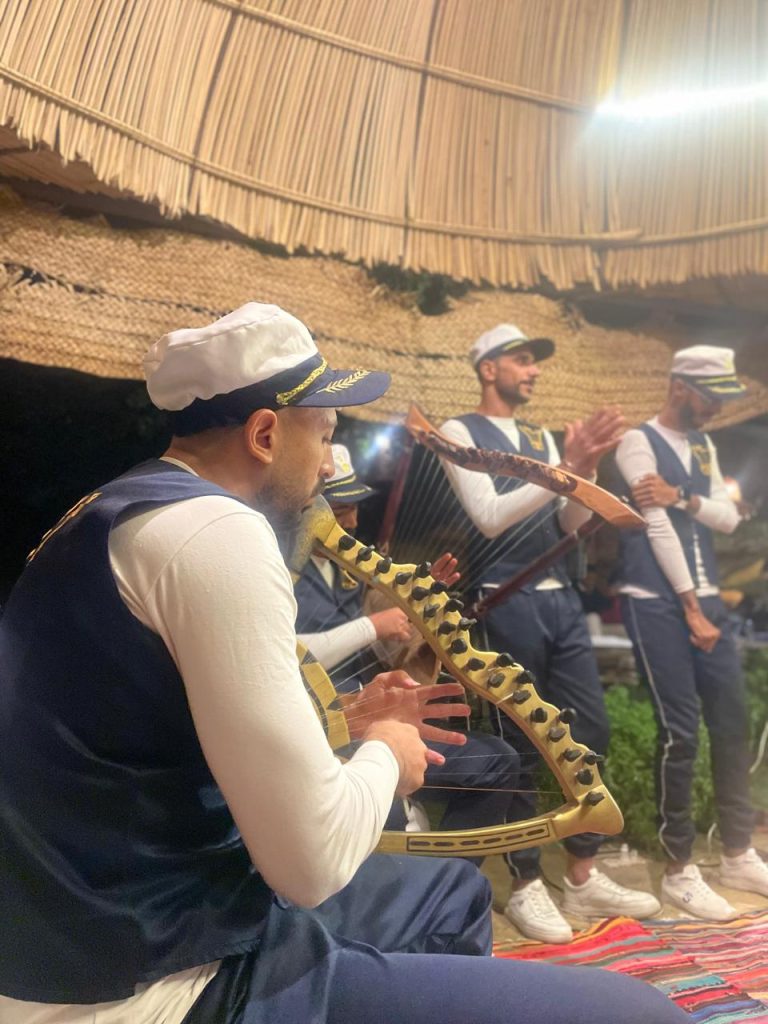
Safeguarding measures presented by Egypt
Dr. Nahla Imam adds that the safeguarding measures presented by Egypt for the simsimiyya include organizing festivals and establishing children’s groups such as “Bara’em al-Simsimiyya” in Port Said. It also includes organizing competitions in playing the instrument, preserving the craft of making the simsimiyya, and linking it to sustainable development goals. The instrument is environmentally friendly, made from natural materials, provides income, and contributes to mental health through music therapy.
She smiled and said, “The simsimiyya brings joy to people, especially in the canal cities. Who doesn’t enjoy the simsimiyya, and who doesn’t dance when they hear it being played?”
Dr. Nahla Imam is an expert in intangible cultural heritage at the National Commission for UNESCO, deputy head of the Egyptian delegation to UNESCO’s Intangible Cultural Heritage Committee, and professor of customs, beliefs, and popular knowledge at the Higher Institute of Folk Arts at the Academy of Arts. She is also a member of UNESCO’s International Evaluation Committee for the Arab States.
Teaching children and women to play the simsimiyya
In the city of Port Said, Mohamed Masad, co-founder of the Al-Nadaha initiative to teach children and women to play the simsimiyya, said: “The project came about after research and a period of recording the heritage of old simsimiyya songs. The idea that there was only one maker of the instrument in the city was worrying. So I launched the project to teach children and young people how to make the instrument and then play it.“
Masad added: ”The project received support from the Beyond the Capital program at the Goethe Institute. One of the striking discoveries was that more than half of the attendees were girls, and four female simsimiyya makers graduated, having completed their own instruments.” In Ismailia, brothers Mohamed and Ahmed Yahya Muller launched their own band to continue the legacy of their late father, Yahya Muller, founder of the Ismailia Folk Instruments Band.
The challenge of strategic selection
Dr. Nahla Imam says: The process of selecting the heritage element to be registered on UNESCO’s lists was difficult due to the large number of elements we need to register. She pointed to the competition among famous folk elements such as the Sabou ritual, fava beans, kushari, rababa, and simsimiyya.
She added: “The selection is subject to evaluation by specialized committees, such as the Heritage Committee of the Supreme Council of Culture, which studies the state’s readiness to support the selected element. In addition to UNESCO’s basic requirement that the element must first be registered at the national level.”
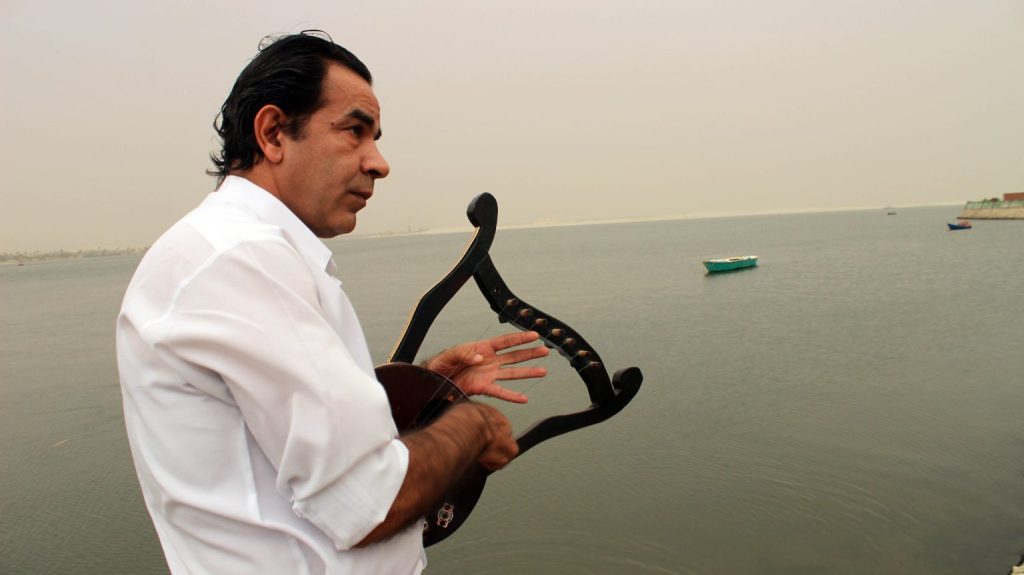
The simsimiyya: an excellent choice
When discussing folk musical instruments, Imam referred to the enthusiasm of Dr. Mohamed Shabana, professor of folk music at the Academy of Arts, for the simsimiyya, saying:
The simsimiyya is an instrument that has all the qualities that qualify it for registration. It is ancient, with roots stretching back to ancient Egypt, and is widespread in the Suez Canal region, Nubia, and the Red Sea basin. It has a strong cultural presence among the people. It is still played at celebrations in the cities of the canal.
Dr. Nahla Imam highlighted an exceptional strength in the Egyptian file, which is the instrument’s accompaniment of the popular resistance in the canal cities during the wars from 1956 to 1973. She cited the story of Captain Ghazali in Suez, saying: “Captain Ghazali would take the simsimiyya and go out in front of the soldiers and sing.” Everyone would join him, and he would inspire them with enthusiasm.”
Preparing the registration file and international success
The registration file submitted to UNESCO must include documents, approvals, and photographs, in addition to a video film. The film was produced by the National Cinema Center and took two years to prepare, according to Nahla Imam.
She pointed out the challenges the team faced, such as the insistence of the film’s director, Haytham Sharif, on filming in the Suez Canal at a specific time, which required obtaining numerous permits. She also emphasized that they focused on showing the joyful and happy side of the film rather than focusing too much on the war. This was to avoid any perceptions that the region was in conflict.
She said, “The film won the admiration and applause of all the countries participating in the meeting, and the team dedicated this effort to the heritage campaign, the simsimiyya musicians, and the people who are determined to preserve their heritage.”
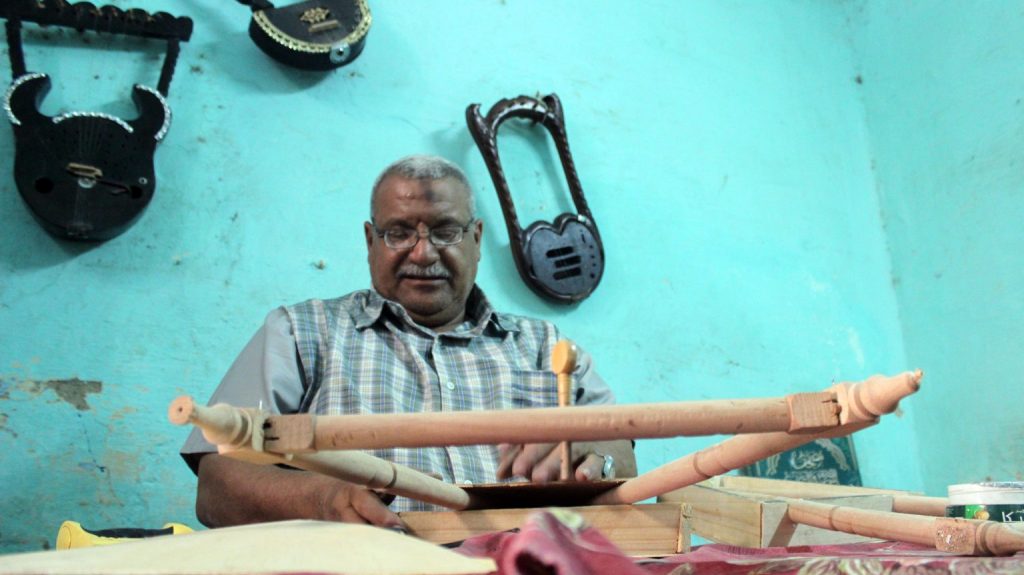
registration strategy
Egypt’s representative to the UNESCO committee explained that the regulations give each country the right to register one element every two years to avoid a backlog of files, so Egypt relied on joint registration with Saudi Arabia, where the instrument is found in the Red Sea basin, which showed the diversity and richness of the instrument.
She said that after the registration, Egypt received official requests from Jordan to join the registration file, as well as unofficial requests—so far—from Yemen and Sudan to register their heritage of the instrument, confirming that the heritage of the simsimiyya is shared among countries, but each country highlights its diversity and cultural specificity.
Egypt’s future files
Dr. Nahla Imam pointed out that UNESCO’s lists are divided into three categories according to the degree of pressure on the registered element, namely:
- The Urgent Safeguarding List: This includes elements that are threatened with extinction, and Egypt has two elements on this list, “Aragouz” and “Hand Weaving,” which need immediate support.
- Representative List: This is where the simsimiyya is registered, along with eight other elements, including woodcutting, Arabic calligraphy, henna, and the Hilaliya epic.
- List of Good Practices: This includes successful experiences in preserving intangible cultural heritage.
Imam revealed that the next file to be submitted for evaluation is “koshri,” which is currently under review, with results expected in December. She added that among the elements proposed for future registration are handmade pottery, the oud instrument, and palm weaving as part of the palm industry file.

